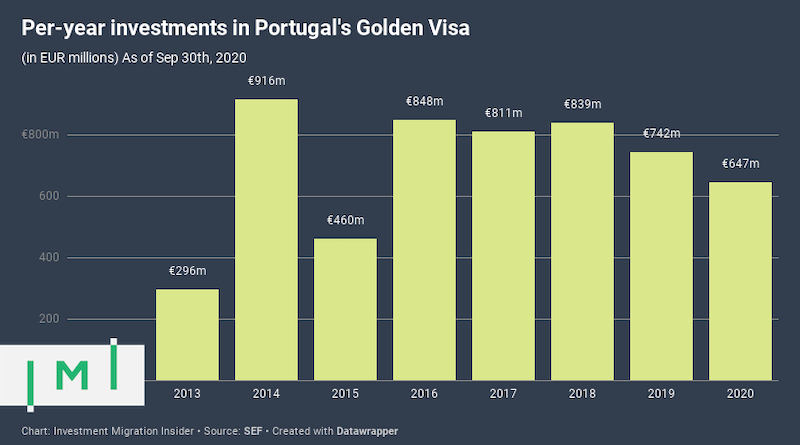Only Chinese and Brazilians Got More Portuguese Golden Visas Than Americans in 2020
The circumstances of 2020 considered, Portugal’s golden visa performed admirably; though program investment recorded a 13% reduction, the number of applications approved during the year (1,182) was only 5% lower than that of 2019. Total investment in the program for 2020 amounted to EUR 647 million, a slight reduction from the EUR 742 million raised last year. That revenues have fallen more than application numbers is owed to the rising popularity of alternative – and, many would argue, economically more meaningful – investment classes, chiefly renovation-slated real estate and investment funds.
Indeed, the proportion of applicants that chose what we’ve termed “alternative” assets (any investment option that isn’t the conventional EUR 500,000 real estate acquisition) rose from 24% in 2019 to 33% in 2020. The strongest relative growth in popularity was observed in the EUR 350,000 investment fund category (subparagraph 7), which drew six times as many applicants in 2020 as in 2019 – though still amounting to only 4% of the total.
In absolute terms, however, the strongest growth was observed in the EUR 350,000 renovation-property segment; 305 main applicants opted for fixer-uppers this year, 91 more than in 2019. Starting from July 1st this year, housing in real estate hotspots Lisbon, Porto, and the Algarve will not qualify buyers for the golden visa, so the refurbishment category is expected to increase its share of the total further in 2021.
The most notable change in 2020 compared to previous years, however, remains the astonishingly sharp rise in interest among Americans, a phenomenon that has not, to be sure, been idiosyncratic to Portugal’s golden visa but one which has been observed across the board.
Having contributed 75 main applicants throughout the year, Americans – for the first time – appeared in the annual Top 5 of applicant nationalities. And a strong debut it was; only Chinese (296) and Brazilian (126) applicants were more numerous. South Africans and Turks accounted for 74 and 72 applicants, respectively.
Patricia Valadas Coriel of Lisbon-based law firm VCA Valadas Coriel & Associados, chalks the newfound American appetite for European residence permits up to a “perfect storm” of factors, explaining that Americans’ motives are as diverse as the country itself:
“For some, it is dissatisfaction with Trump; for others, it’s apprehensions about Biden. Then there’s the relatively poor handling of the pandemic, as well as political instability and unrest.”
One common denominator among Americans, though, she explains, was concerns about taxes.
“All these things have had an influence,” Coriel points out, “but what really brought things to a head this year was the experience of seeing almost the whole world shut its doors to Americans. So many Americans were frustrated by not being able to travel to Europe, and finally decided to get an EU residence permit.”
Christian Henrik Nesheim is the founder and editor of Investment Migration Insider, the #1 magazine – online or offline – for residency and citizenship by investment. He is an internationally recognized expert, speaker, documentary producer, and writer on the subject of investment migration, whose work is cited in the Economist, Bloomberg, Fortune, Forbes, Newsweek, and Business Insider. Norwegian by birth, Christian has spent the last 16 years in the United States, China, Spain, and Portugal.



